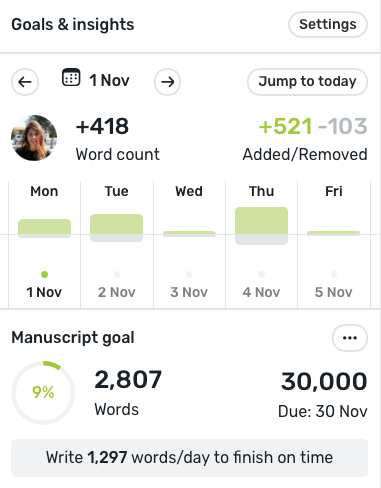Posted on Apr 04, 2023
How to Set Effective Writing Goals (That Will Help You Grow)
About the author
Reedsy's editorial team is a diverse group of industry experts devoted to helping authors write and publish beautiful books.
More about the Reedsy Editorial Team →Achievable writing goals require a certain ability to look inwards. You must evaluate where you are in your writing life, where you want to go, and how you work best. If your plan is to start writing a novel (and actually finish it), you need time in your daily grind to intentionally work toward it. But how can you set goals that are realistic and useful and lead you “confidently in the direction of your dreams”? Let’s break it down.
1. Observe your own habits and patterns
 Each person responds differently to goal-setting. Set writing goals that are useful to you by taking stock of what you know about yourself: what type of writer are you? How do you react emotionally when faced with concrete goals? And when can you realistically squeeze some writing into your schedule?
Each person responds differently to goal-setting. Set writing goals that are useful to you by taking stock of what you know about yourself: what type of writer are you? How do you react emotionally when faced with concrete goals? And when can you realistically squeeze some writing into your schedule?
Are you a pantser or a planner?
Someone who writes with a detailed outline will approach their goals differently from "discovery writers" who start with a vague idea and then follow their intuition. So which are you: a planner or someone who flies by the seat of their pants?
Think back to the last time you wrote in a flow state, where you were completely dialed in, and words poured out of your pen (or keyboard). Were you following a plan or free-writing? If you’re unsure, imagine someone handing you a piece of paper and pen right now and asking you to try a bit of creative writing. Would you feel excited or stressed? If it’s the latter, you’re likely a planner.
FREE TOOLKIT
Get our Top 3 Book Outline Templates
Outline your novel with the Hero’s Journey, Three-Act, or Save the Cat structure.
We’ll use this insight to inform your goal-setting later on. For now, let’s think a little deeper about what types of goals excite you or freak you out.
Do goals motivate or stress you out?
There are two common emotional responses to being given a goal:
- Enthusiasm. The rush of possibility as you glimpse a future when you accomplish your dream through determination and hard work.
- Dread. A heavy sinking feeling, a doubt that this is possible.
If someone told you that “writing 500 words a day means you’ll have 15,000 words of your novel written in a month’s time,” which of those two feelings do you lean towards?
Some writers would thrill at that goal. But if you are overwhelmed, try fitting your goal-setting to your personality. Just as sprinters don't wear hiking boots, writers must set goals that accommodate their temperament and circumstances.
Find a writing resolution you deem achievable: 100 words daily? 500 per week? Ideally, it should challenge you but is still within your reach. We’ll look at how to set such goals for yourself later on in the post.
Now, let’s take a look at your calendar.
How much time can you dedicate to your writing?
Try this spy game: for a week, track how you spend your time from Monday to Sunday. Keep a log of what activity takes up each hour.
At the end of the week, review this table. Aside from work, sleep, house chores, or childcare, what activities take up your leisure time? Do you have any weekday evenings free, or are your weekends the only time you have to yourself? Which activities could you minimize or occasionally sacrifice to make time for writing?
You might initially be discouraged, especially if your week is crowded with commitments and obligations. Ignore that feeling, though. Knowing your availability doesn't make writing harder; it just helps you set realistic goals that are more realistic, saving you disillusionment and disappointment down the road.
Now that you’ve compiled this information about yourself, there's one more tough question to face...
What’s stopping you right now?
Because you're reading this guide, we can assume you want to write but are struggling to do so. So, what’s brought you here? In some way, are you suffering from writer’s block?
If you're not sure what's stopping you, our 1-minute quiz will help you diagnose the root of your writer’s block.
🩺
Writer MD
Let us diagnose the cause of your writer's block with our 1-minute quiz.
Armed with self-awareness and realistic expectations, let’s work towards some goals.
2. Establish your long-term writerly ambitions
 In your most private thoughts and dreams, protected from criticism and the expectations of others, what do you see yourself achieving? There's no judgment here.
In your most private thoughts and dreams, protected from criticism and the expectations of others, what do you see yourself achieving? There's no judgment here.
Do you see yourself stepping onto a podium, accepting a multi-million dollar contract to the sound of applause? Are you clutching a printed copy of your published novel for the first time? Or maybe you see a way through the fog of poor mental health — into a routine where writing is your joyful outlet?
Publishing success takes many forms — there's no right or wrong way to achieve it. Take a moment and privately note what writing accomplishment would make you truly happy.
Here are a few examples of writing goals to give you some inspiration.
Project-oriented goals
- “I want to complete a novel.”
- “I want to share my journey by telling my personal story”
- “I want to write an account of my family history for my children to keep.”
- “I want to write a short story collection united by a cohesive theme.”
Publication-oriented goals
- “I want to traditionally publish my novel.”
- “I want to find a literary agent to represent me.”
- “I want to publish a book before I’m 50.”
- “I want to publish a short story in a literary magazine.”
Habit goals
- “I want to build a daily writing habit.”
- “I want to journal every week.”
- “I want to get used to starting new projects and not fear the blank page.”
Growth goals
- “I want to become a better writer.”
- “I want to join a writing workshop and exchange feedback with others.”
- “I want to take a creative writing class to improve my writing skills.”
Emotional goals
- “I want more creativity in my life.”
- “I want to feel like I am using my talents.”
- “I want to prove to myself that I can write a book, even if it’s hard.”
- “I want to help at least one reader with my hard-earned knowledge on X subject.”
- “I want to write something that brings comfort to a reader.”
If your goal spans more than one category, that’s fine. These categories are simply a reminder that all sorts of goal types are acceptable. No one goal is better or nobler than another.

FREE COURSE
How to Build a Solid Writing Routine
In 10 days, learn to change your habits to support your writing.
Focus on goals that are within your control
Some goals, like winning the Nobel Prize for Literature or becoming a #1 bestseller on Amazon, are not really up to us. They’re perfectly valid dreams, but they depend on external factors we can’t control. So try to avoid external validations in your goal statements.
Instead, focus on things within your control: honing your skills, writing the best book you can, pitching your ideas to agents confidently, or crafting a well-researched book proposal and promoting it without feeling shy. Whether or not the book goes on to win awards is out of your hands.
🏆 If bestseller status is important to you, check out author Brad Aronson’s success story and find out how he worked with a Reedsy marketer to get on a national bestsellers list.

So now that you've established your bigger dream let's break it down into tangible steps you can face without being overwhelmed.
3. Break your big goals down into smaller milestones
Most projects have several phases. A project manager (in this case, you) must start by looking into what their project will involve. Your aim at this stage is to plot out all the milestones you'll pass on your way to the finishing line. At all points in your writing process, you want to know what's happening once you pass your next milestone.
Example goal: writing a book
If your dream is to write a book, these might be the milestone objectives you’d aim for in the writing process:
- Write a book outline. In great detail if you’re a planner, or sketched out if you’re a pantser
- Complete drafts of each act comprising your story’s structure (if applicable)
- Completed drafts of every sub-section of each chapter
- Drafts of every individual chapter
- Draft 2. Resolve any pending issues or story gaps
- Draft 3. Get feedback from friends or fellow writers
- Draft 4. Get feedback from a developmental editor
- Draft 5. Consider suggestions made by a copy editor
- Draft 6. Consider any further edits made by a proofreader
Turning a project from an idea to a polished manuscript is a project in itself. Publishing it will be, to some extent, a second project. You’ll face a different process depending on whether you’re hoping to publish your book traditionally or independently, so check out these related resources on our blog for a breakdown of those:
✅
Is self-publishing or traditional publishing right for you?
Takes one minute!
When you’ve completed your research and understand what it will take to meet your goal, let's draw out a step-by-step game plan.
4. Turn each milestone into a realistic, achievable task
 If you ever find you can’t work toward your bigger goal, you can usually assume that your stepping-stone goals aren’t small enough. Always break goals down into smaller tasks.
If you ever find you can’t work toward your bigger goal, you can usually assume that your stepping-stone goals aren’t small enough. Always break goals down into smaller tasks.
Use the SMART system, if it helps you
One popular way to do this is to use the SMART framework. This acronym stands for Specific, Measurable, Achievable, Relevant, and Time-Bound. The idea is that objectives that meet all five criteria are guaranteed to be realistic and plausible. They outline when and how regularly you will work toward these objectives in a way that doesn’t allow for uncertainty.
Here are some examples of SMART writing goals:
Specific goals
To take the first step toward your bigger goal, you’ll have to move from vague hopes and dreams to specific, practical, and actionable tasks.
Vague goal: “I will contact more literary agents.”
Specific goal: “I will create a submission spreadsheet and send out 1 to 2 query letters every Friday, starting from the agents I believe to be the best fit for my work and progressing down my list.”
Measurable goals
Specific goals are great, but numerical goals can help give each activity a sense of scope.
Vague goal: “This year, I will write more.”
Measurable goal: “In January, I will write 8,000 words of my novel, keeping track of which days of the week are most productive for me and why. Once I have established that, I will aim to write only on my two most convenient days each week, adding 1,000 words each day.”

If you work on your draft in our free writing app, Reedsy Studio, it’ll keep track of your daily writing progress for you. Set an overall manuscript goal with a deadline and it’ll automatically calculate how many words you still need to get there — with the option of signing up for gentle email reminders if you fall behind.
If word counts stress you out, make your goals measurable in other ways: commit to writing X number of days a month, or dedicate X number of hours to your writing every weekend. Measure your progress in a way that still requires you to invest time and effort but takes a little pressure off of the outcome.

FREE WRITING APP
Reedsy Studio
Set goals, track progress, and establish your writing routine in our free app.
Achievable goals
Whether a goal is “achievable” is highly dependent on your personal circumstances. So this is where the reflection we did in step one comes in handy. Be ambitious but realistic, or you’ll soon find yourself drifting.
Not achievable: “I will join NaNoWriMo despite being depressed and will produce a full draft of a novel even though I do not have an outline yet.”
Achievable: “I will take NaNoWriMo as an opportunity to write on ten different days in November, but I won’t stress about word count since I’m not in my best mental shape.”
Relevant goals
Having established your long-term ambitions, double-check that any goals you set will actually lead you there. Avoid tasks that are actually procrastination in disguise (e.g. testing every writing software in the market before you get started.)
Irrelevant: “I will invest considerable time in learning to use Scrivener to copy my planning notes there before beginning my draft.”
Relevant: “I will tidy notes relating to my first chapter this weekend, then on Monday I will begin drafting without delay to maintain momentum.”
Time-Bound goals
Every college student knows how deadlines can inspire a frenzy of productivity. Setting goals with deadlines will help you stay on track — otherwise, the endless stretch of days ahead fails to create any sense of urgency.
Not time-bound: “I will send my manuscript to an editor when it’s ready.”
Time-bound: “On September 1st, I will send my manuscript to an editor, so any major changes will need to be done by then.”
Editors are often busy a few months in advance, so if you feel like you need a real external deadline to motivate you, get in touch with Reedsy’s developmental editors and agree on a submission date ahead of time. Be careful to agree on a date that feels genuinely doable!
Hire a talented developmental editor on Reedsy
Lottie H.
Available to hire
Editor and proofreader with 3+ years' experience at HarperCollins and an expert eye for detail! Keen on women's fiction and fantasy.
Jennifer R.
Available to hire
Bestselling Editor of PICTURE BOOKS, MG, and YA like The Hunger Games! Excited to help make your story stand out, shine and be market-ready!
Caroline L.
Available to hire
New York Times Bestselling, critically acclaimed novelist. Manuscript editor, will help you get your work in shape for agents/publication.
Goals that follow the SMART framework can be incredibly helpful because they force us to engage with the plausibility of each goal. Life, however, can come with some surprises.
5. Be flexible and prepared for obstacles
 A wise goal-setter is emotionally prepared for obstacles and can adapt their goals to meet changes in circumstances. You may find that writing a book takes longer than anticipated (*nods in George R. R. Martin*), or you're dealing with unexpected life events that leave little room for pursuing your writing goals.
A wise goal-setter is emotionally prepared for obstacles and can adapt their goals to meet changes in circumstances. You may find that writing a book takes longer than anticipated (*nods in George R. R. Martin*), or you're dealing with unexpected life events that leave little room for pursuing your writing goals.
Adapt your goals
Say your goal is to submit your poems to 30 literary magazines, but then life got in the way. Adjust the goal to fit your new circumstances: submit to 15 magazines instead at the same pace. Or commit to sending any that don’t get done as soon as your situation improves.
Alternatively, re-orient the focus of your goal — instead of tracking the number of poem submissions, commit to dedicating the next three weekends to this task, regardless of the outcome.
Have compassion for yourself
Writers are notorious perfectionists, so this is worth saying this out loud: “failing” to meet a particular goal is not the same as failing to be a writer, or a good writer, or a successful writer. Do not hold yourself to impossible standards.
Any struggle to meet your writing goals shouldn't result in existential doubts about whether you’re really a writer or not. We’ll just leave you with this quote from acclaimed writer George Saunders: "Even if you're not actively writing because you are too busy, you are still a writer, because of the way you regard the world — with curiosity and interest and some sort of love. No need, then, to declare that one is or is not a writer. You just are, because of how you think."
Whether you reach your goals entirely or in part, you still have cause for celebration.
6. Celebrate your achievements
 Do you know how easy it is to live life on autopilot? The easiest thing to do is to resign yourself to your daily grind, passive, never even hoping to write anything.
Do you know how easy it is to live life on autopilot? The easiest thing to do is to resign yourself to your daily grind, passive, never even hoping to write anything.
The very act of deciding to evaluate where you are in life and setting writing goals to move in the direction of your dreams is already admirable, considering how exhausted everyone tends to be in their everyday hustle. After all, who wants to write, when you can just lean back and watch Netflix?
You have made that decision, and now you’ll work on accomplishing your writing goals. Who cares if it takes a little longer than you planned, or if you submitted to fewer lit mags than you hoped, or if you only wrote for five days a week instead of seven? You’ll still be miles ahead of where you were when you first started, and that’s a reason to celebrate your efforts.
Your journey toward your dreams will involve adversity and struggle — that’s inevitable. But do you know what matters the most? You’re on your way.











